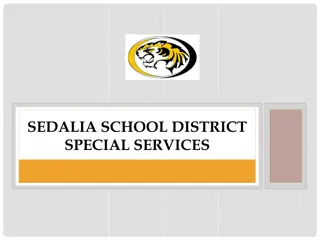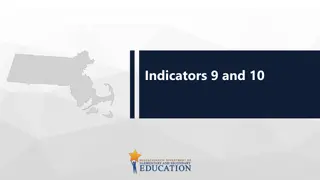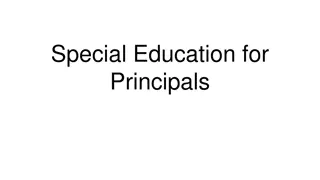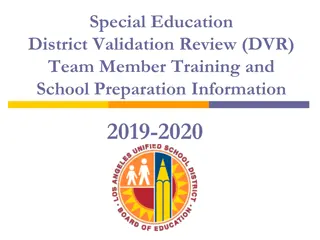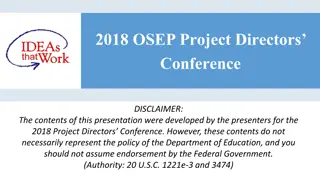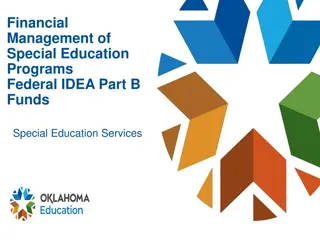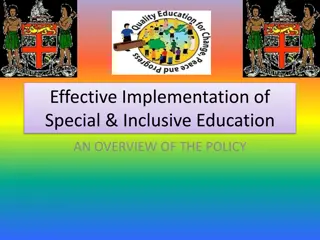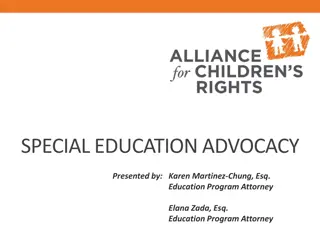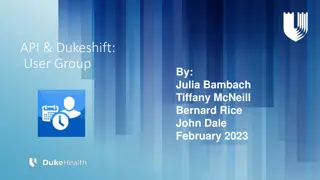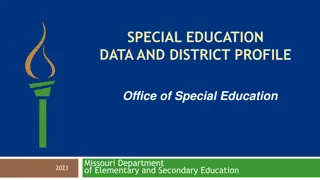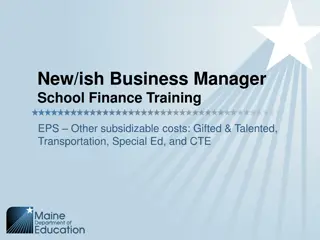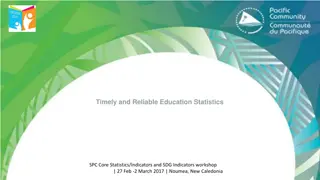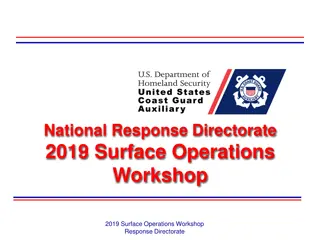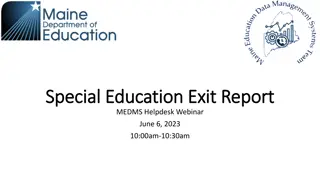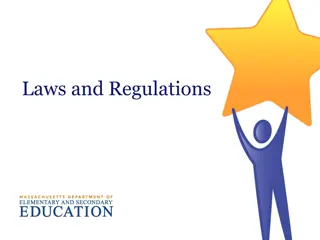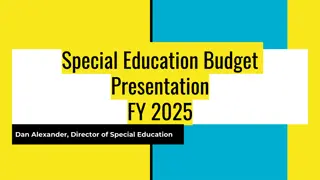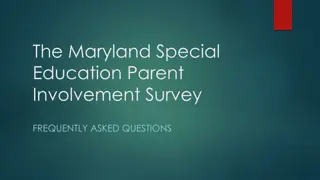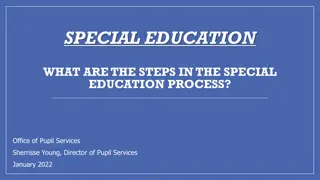Best Practices for Special Education Case Management Workshop
This workshop presented by Notre Dame de Namur University focuses on equipping learners with the best practices in special education case management. Participants will gain knowledge on SpEd case management, collaboration strategies, and creating legally defensible IEPs. The workshop covers topics such as different types of IEPs, Extended School Year (ESY), Disability Determination, and more. It emphasizes using professional best practices and does not provide specific legal advice or district-related training. Attendees are encouraged to engage in activities like KWL for Case Management to deepen their understanding. With insights from experienced professionals, this workshop aims to enhance the skills of special education teachers and related services providers.
Download Presentation

Please find below an Image/Link to download the presentation.
The content on the website is provided AS IS for your information and personal use only. It may not be sold, licensed, or shared on other websites without obtaining consent from the author. Download presentation by click this link. If you encounter any issues during the download, it is possible that the publisher has removed the file from their server.
E N D
Presentation Transcript
Best Building the Better IEP Presented by Notre Dame de Namur University
Learner Objectives By the end of the workshop, the learner will know the best practices for SpEd case management. the best practices for SpEd strategic collaboration. the best practices for creating legally defensible IEP. Accurate Information Services and Supports Types of IEPs ESY Extended School Year Disability Determination CA State Assessments Goals and Progress Reports ITP Individual Transition Plan Special Factors Incl. Behavior FAPE Offer
What the Workshop IS and IS NOT Workshop IS Workshop IS NOT Providing legal advise on a specific IEP(s) .. Training on how to create a legally defensible IEP .. .. by providing general background information .. .. related to a specific school district(s) .. .. and using professional best practices. .. and directing the use of a specific best practice(s).
You Say I Say When You Say Is it legal to ? Then I Say Ask a lawyer. Why is my school district saying I have to ? School districts differ. Are you telling me I have to ? Use best practices.
There is nothing more unequal than the equal treatment of unequal people. Thomas Jefferson
Case Management
KWL for Case Management In column #1 (left) write 1 fact you know about Special Education Case Management and how you know it to be true. In column #2 (middle) write 1 thing you want to learn about Special Education Case Management. Leave column #3 (right) blank and you will complete it after the training. Be prepared to share this information with us.
Who is a Case Manager? A case manager is a credentialed Special Education Teacher or Related Services Provider who is the coordinator for the delivery of instruction and services, the contact with the parents and family, and the student advocate. That is YOU.
Assignment of a Case Manager Case management is usually assigned to the Special Educator who delivers the fundamental or foundation service. Every student with an IEP has a case manger. DIS RSP SDC
The Intervention Cycle and Case Management Gen Ed 504 SST SpEd RtI
Who Is the Appropriate Case Manager? For a student who is only receiving speech therapy? DIS Speech Therapist For a student who is receiving speech therapy and RSP? RSP Teacher For a student who is receiving physical therapy and SDC? SDC Teacher For a RSP student who is fully included in a Gen Ed class? RSP Teacher
5 Cs of Case Management Coordination Communication Curriculum Collaboration Consultation
Traditional View of Our Role as a Special Educator Teacher Case Manager
There is not enough time in the day to get everything done!
What the Data Shows 75% Teaching Time at the Elementary Level 65% Teaching Time at the Secondary Level
Options for Creating Case Management Time for Elementary Teachers Walk-On PE Coaches Art and Music Taught by Parents Roving Substitute Teachers Full Inclusion Students Combining Classes
Options for Creating Case Management Time for Secondary Teachers Teacher Preparation Periods Teacher Case Management Periods Substitute Teachers at School Who Bank Time Full Inclusion Students Strategic Student Scheduling
Case Management and Documentation Case Management Documentation Does Not Equal Case Management Documentation Does Require If it is not documented it is a s/he s/he said situation without any evidence. There are two sides to every story and the truth usually lays somewhere in the middle.
Case Management Contact Log Date Type Purpose Comments 02/17/17 Telephone Invite parent to P/T conference No answer so left message 02/17/17 Telephone Invite parent to P/T conference No answer so left message 02/18/17 Telephone Parent responded re P/T conference She will be attending 02/18/17 Telephone Parent responded re P/T conference She will be attending 02/22/17 Meeting P/T conference #1 Agreed to meet 2 02/22/17 Meeting P/T conference #1 Agreed to meet 2nd nd time 03/01/17 Telephone Schedule follow 03/01/17 Telephone Schedule follow- -up P/T conference Agreed on 03/14/17 up P/T conference Agreed on 03/14/17 03/14/17 Meeting P/T conference #2 All issues resolved 03/14/17 Meeting P/T conference #2 All issues resolved 03/21/17 Note 03/21/17 Note Note Note sent home re behavior Great day re no outbursts sent home re behavior Great day re no outbursts 03/23/17 Telephone Schedule annual IEP Suggested 04/01/17 at 08:00 03/23/17 Telephone Schedule annual IEP Suggested 04/01/17 at 08:00 03/24/17 Note Parent agrees to IEP date Send out IEP notice of 03/24/17 Note Parent agrees to IEP date Send out IEP notice of mtg 03/25/17 Mail IEP notice of 03/25/17 Mail IEP notice of mtg mtg IEP 04/01/17 at 08:00 time mtg IEP 04/01/17 at 08:00
Case Management and Confidentiality Information related to Special Education students is confidential. School staff who have a need to know should be provided with this information. School staff who receive this information must keep it confidential. Have I provided too much or too little information in order for the student to receive the very best education and services? Have I provided the information to too many or too few school staff for the student to receive the very best education and services?
Case Management and Initial IEPs A student who is referred for an initial assessment is not in Special Education but does require a Special Education Case Manager. The best practice is to have a rotation basis by which both RSP and SDC teachers share the responsibility unless it is a DISonly student. An initial assessment is to determine if the student has a disability and needs Special Education. It is not an initial assessment for Special Education.
Case Management and Student Advocacy The most important ROLE of the Case Manager is to be an active advocate for each student with a disability caseload. Big picture on your Small details Everything else Always look through the lens of student advocacy.
Case Management and the IEP The most important TASK of the Case Manager is to create a legally defensible IEP and any necessary addendums student with a disability on your caseload. for each
What Is a Legally Defensible IEP? A legally defensible IEP is a document developed in collaboration with all appropriate stakeholders that includes all legally required information written in professional language and with the degree of specificity required for the unfamiliarreader to fully understand the content and implement the plan.
IDEA 2004 Guidelines for IEP Team Membership Student (if appropriate) Parent(s)/Guardian(s) General Education Teacher Special Educator (Case Manager) LEA Representative (Administrator or Designee) DIS Service Provider(s) Others invited by school district as appropriate Others invited by parent/guardian as appropriate
Its All About the Calendar A persistent and significant concern is the missing of due dates many of which are specified in the law. Purchase a year-long calendar and make sure all school district dates are entered on it (holidays, vacations, trainings, etc.). Make sure all IEP due dates are entered on it. Make sure all IEP progress report due dates are entered on it. Look for conflicts (holidays and IEP dues dates, etc.) and reschedule in order to eliminate the conflicts. Keep the calendar updated on a regular schedule.
Changing IEP Due Dates You CAN schedule an IEP earlier than its annual due date. You CANNOT schedule an IEP later than its annual due date. You CAN plan strategically for IEP due dates. You CANNOT ask the parent/guardian for an extension.
Examples of Changing an IEP Due Date Mary s annual IEP due date is June 12, 2015. It is the last instructional day of the school year and the same day as the high school graduation. Move Mary s IEP forward to mid or late May 2015. Mark s annual IEP due date is April 15, 2015. It is in the middle of spring break which begins on April 7, 2015. Move Mark s IEP forward to early April 2015.
Another Example of Changing an IEP Due Date Betty s annual IEP due date is October 1, 2014 and her triennial IEP due date is November 2, 2014. Both dates are cleared on her teacher s calendar to convene these 2 IEPs. Move the triennial IEP due date forward to coincide with the annual IEP due date. It is fairly common to have annual and triennial IEP due dates which are not consistent with one another. Always try to eliminate this inconsistency by moving the later IEP forward to the earlier IEP within reason.
It Was a Mess When I Got Here! It is your 1st day on the job as a RSP teacher. In reviewing your 28 students IEPs you notice that 5 are already overdue, 6 are coming up within the next month, and the remaining 17 are well spaced out for the remainder of the school year. What would you do? But then what would you do? Focus on the upcoming 6 IEPs to make sure they are completed by the annual due date and then work on catching up the 5 overdue IEPs.
School Districts Differ Greatly School districts differ greatly in their cultures and approaches to doing the business of educating students. The best practice is to adapt to and/or adopt the culture and approaches. School districts differ greatly in their interpretation and implementation of the FED and CA Special Education laws. The best practice is to understand the rationale behind the interpretation and implement accordingly.
KWL for Case Management You previously completed column #1 (left) and #2 (middle) of the KWL chart and shared that information with us. In column #3 (right) write 1 fact that you learned about Special Education Case Management. Be prepared to share this information with us.
Selected IEP Topics Part 1
Accurate Information The IEP information must be accurate because the CA CASEMIS accountability system is data-based. If this is the 1st IEP for the student, check every bit of information from original source documents. If the same information is needed in more than one IEP section, make sure it is repeated exactly. If the information is not accurate, it will be detected at DEC and JUNE data dumps and require correction. If the information is not accurate (garbage in garbage out), it will invalidate any program decisions undertaken by the school district.
Typical Information Legal Name No nicknames Date of Birth Age in Years + Months Gender Ethnicity ELL Designation Migrant Designation Native Language Grade No ungraded Parent/Guardian Name Home Address City, State, Zip Home Phone Work Phone Cell Phone Email Address
Accurate Information - Name The probability that more than one student has the same name is significant. 4,292,303 = Michael in USA 2,863,223 = Smith in USA 37,809 = Michael Smith in USA 734,422 = Total CA Students with Disabilities
But Isnt A Name A Name? The student s legal name is Juan Jose Rodriguez-Mendoza but the computer does not know that. It only knows what you tell it and it has the student listed under 10 different names. Juan Rodriguez Juan Mendoza Juan Rodriguez-Mendoza Jose Rodriguez Jose Mendoza Jose Rodriguez-Mendoza J. Rodriguez J. Mendoza J. Rodriguez-Mendoza John Rodriguez-Mendoza
10 Most Common First and Last Names Common First Names Michael James John Robert David William Mary Christopher Joseph Richard Common Last Names Smith Johnson Williams Brown Jones Garcia Rodriguez Miller Martinez Davis
IEP Notes Page Only the noteworthy things that happen during the IEP team meeting are captured in the notes. Everything during the IEP team meeting is captured in the notes. that happens This is not practical for a number of reasons. This is very practical.
Identify the Noteworthy Comments Parent recd Procedural Safeguards IEP goals progress reviewed Parent concern re communications IEP goal reworded/dropped because IEP follow-up meeting scheduled SLP missed 10 sessions no make-up Parent contact info remains same Inclusion time reduced by 25% Parent req OT and PT assessments Transition goals added Translator/interpreter not present Parent req IEP translation Spanish Yes No there is another IEP section Yes Yes Yes Yes No there is no change Yes Yes No ITP goals are identified as such Yes Yes
Who Does the IEP Notes Page? The Special Education Case Manager is usually the person identified as the facilitator of the IEP. It is a best practice to have the IEP facilitator and scribe roles assigned to different persons. Regardless of whom is assigned to what role, always read out loud any information that is entered on the IEP form during the meeting to ensure that all participants are aware of the information, how it is worded, and that they agree to its content and wording. The IEP facilitator should be fully engaged in creating and maintaining a cooperative and collaborative atmosphere in order to create the very best IEP for the student.



